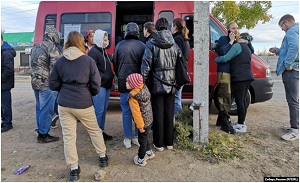Ukraine war: the bloody mobilisation of Buryatia
 Moscow (AsiaNews) - Putin's order to recruit 300,000 new soldiers for deployment in the conflict is being carried out in a chaotic manner at the local level. Invalids and fathers of families with several children are also called up. The disappearance of men from villages, especially in Siberia, leads to the paralysis of communal life.
Moscow (AsiaNews) - Putin's order to recruit 300,000 new soldiers for deployment in the conflict is being carried out in a chaotic manner at the local level. Invalids and fathers of families with several children are also called up. The disappearance of men from villages, especially in Siberia, leads to the paralysis of communal life.
Vladimir Putin's new call to arms is proving very chaotic and brutal in Buryatia. The Mongol republic of Russia already holds the record in the percentage of dead in the conflict in Ukraine, compared to all the other nearly 100 regions of the Russian Federation. Residents report that summons cards are also presented to invalids, fathers with many children, those who have not done military service for health reasons, and even the deceased.
The head of Buryatia, Aleksej Tsydenov, admits that there has been some straining of the summoning rules, assuring that those called up 'by mistake' will be able to return home immediately. However, relatives interviewed by Sibir.Realii deny these words, saying that no one returns from the military muster points.
As Natalja Semenova, a typographer from Ulan-Ude, recounts, 'at 7 a.m. there was a knock on the door, looking for my brother who disappeared two years ago; I am still trying to recover from the shock'. Her case is by no means an isolated one, the postcards to deceased people seem to be quite numerous, as confirmed by Alena Kharlamova, whose uncle, who has also been dead for years, they tried to summon.
Lawyers and humanitarian activists point out that the concept of 'partial mobilisation' does not exist in Russian law, so in theory anyone can be summoned. From Buryatia, many flee to neighbouring Mongolia, without hope of being able to prove their inability to serve; several go into hiding in neighbouring Tajga, abandoning family, work and other ties. In the village of Turuntaevo, women gathered in front of the police barracks, which were about to requisition almost all the local men, forcing those who had not done their military service to leave.
Alena from Ulan-Ude reports "my father is 45 years old and is in category B, the one of those unfit for military service, and when they rang the doorbell he was very surprised, he started screaming, but they dragged him away threatening to put him in jail; he said he would try to appeal, but the lawyer gave us no hope". 38-year-old Aleksandr Doržiev, three children from his first marriage and two still young twins from his second union, who according to the rules should not be summoned was also taken into custody. They called him 'for consultations', and as he had not turned up, they picked him up at home at midnight.
Many had already been given a pink card to put on their military booklet ('vennik') days before, stating 'readiness for conscription in case of mobilisation', which was also sent to those who do not have such certification. The wife of one of the leaders of the republican administration explains that 'as early as this summer, they had given my husband the order to organise dozens of volunteers to be sent to Ukraine'.
Many videos and messages of solidarity with those called up are circulating on social media, especially those who should not be called up, and attempts are being made from above to force these messages to be deleted. Of more than 4,000 who were called up in the first two days after Putin's announcement, only 70 managed to return home, as President Tsydenov himself announced.
However, they are only a small fraction of the disabled, as humanitarian activist Nadežda Nizovkina attests: "My phone is blowing up these days, because of how many desperate calls", recounting that even a blind man was summoned who had not yet managed to get an ophthalmologist to give him a disability certificate, and is now stuck in the barracks.
Total chaos reigns at the assembly points, and the situation seems to be getting worse by the day, not only in Buryatia, but throughout Russia. Many regional leaders are caught up in the eagerness to 'go over the top', summoning people at random so as not to be accused of laziness from above, in a crescendo of collective hysteria.
In Buryatia, apart from the capital Ulan-Ude, the rest of the population lives in small settlements of a few hundred people, a situation similar to most Siberian regions, and the disappearance of men from the villages leads to the paralysis of communal life.
by Vladimir Rozanskij
https://www.asianews.it/news-en

